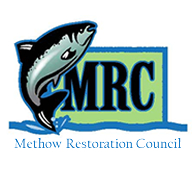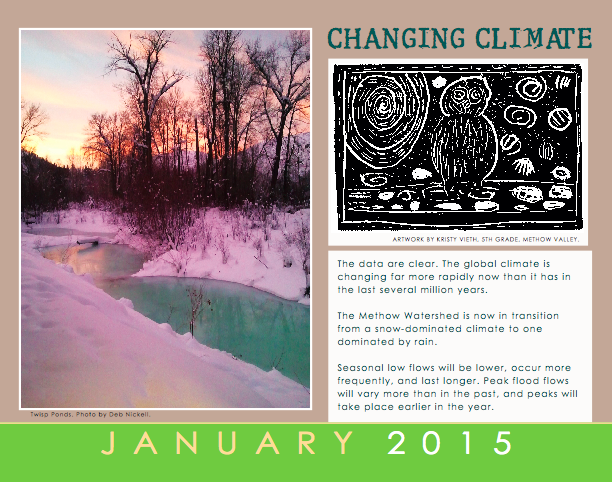

|
Living With the Methow River Monthly Activities and Learning Opportunities January 2015 The climate is changing rapidly around the world, no less so here in the Methow Watershed, but perhaps not so obviously, yet. The Climate Impacts Group (CIG) at the University of Washington, in cooperation with several other Pacific NW universities and agencies, develops detailed climate projections for watersheds throughout the Pacific Northwest. Their models were tested by how well they could ‘predict’ past climate. That means that their models calculated temperatures and precipitation which were then compared to historical data for each watershed. The comparison was close, with the models slightly under-predicting temperature increase and precipitation changes. The models differed on average temperature increase and precipitation changes, but agreed that there will be less snow pack and that snowmelt will occur earlier in the season. This will lead to lower summer flows and higher water temperatures in the Methow, Chewuch, and Twisp Rivers (and all connected tributaries) during summers. All of this means increasing stress on salmon and less available water for human use and agriculture. The frequency and extent of extreme events, such as drought and flooding, are predicted to increase. Thus some years the river levels will be lower than ever seen historically, and other years, flooding will similarly exceed historical records. The CIG also concluded that the frequency of extreme events locally may be much more intense than their statistical models suggest. As we watch world governments dither on climate policy, both for limiting climate change and for adaptation, it is clear that we must consider what we can do locally to adapt to our changing climate. The Methow Watershed Council took some first steps with the help of the U.S.G.S. to help local citizens come to grips with the coming climate changes. Please contact Lee Hatcher, the Methow Watershed Council Director, at (509) 341-4260 with concerns or suggestions. The Methow Watershed Council website is http://www.methowwatershed.com. University of Washington Climate Impacts Group http://cses.washington.edu/cig/ Summary data with graphs for Washington State for 2020, 2040, and 2080. http://warm.atmos.washington.edu/2860/products/sites/ Zoom in on this map and identify the Methow Watershed, then click on the blue pin that you want to see. From there, navigate to the data you want. Graphs are shown to the right. The blue line is historical data, the red line is the model prediction, and the red shading represents the variability in the model prediction. ‘A1B’ represents predictions given a moderate increase in greenhouse gas emissions and ‘B1’ represents predictions given a lower level of greenhouse gas emissions.
This year’s MRC calendar connects to ADVENTURES, ACTIVITIES AND INFORMATION tailored to each month. If you haven't gotten your calendar yet, you can download an electronic version here. Come back each month and find interactive activities, print outs, and suggested learning opportunities in our community.
Just follow the fish and engage in learning.
|


